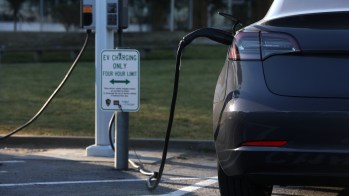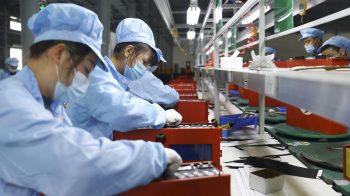Lithium can charge Bolivian economy
TEXT OF STORY
Tess Vigeland: In all likelihood you own something that runs on lithium batteries. It might be a cell phone or a laptop. The world’s lightest material is also in demand for electric car batteries as automakers go green. But the metal is scarce. About half the world’s reserves are in the small South American nation of Bolivia. As Annie Murphy reports, Bolivia plans to make the best of that.
ANNIE MURPHY: Salar de Uyuni in Southwestern Bolivia is best known as the planet’s largest salt flat. Some 400,000 square miles, 10 billion tons of salt and thousands of tourists who come each year to wonder at this vast, otherworldly terrain.
It’s one enormous flat expanse of white nothingness blending into this baby blue sky. You see salt everywhere, you can even hear it crackling under my feet.
About 25,000 tons of salt are extracted every year. But it’s worth little.
And for generations, locals like Calixto Condori, who harvests salt here by hand, have been locked in poverty.
CALIXTO CONDORI: This is tough work, and salt doesn’t have a high price like minerals. We just don’t earn enough.
But that could soon change. Beneath the Salar de Uyuni sit the world’s largest reserves of lithium. International investors and automakers like Japan’s Mitsubishi corporation want a piece of it. Bolivia’s President Evo Morales is determined the lithium won’t just enrich foreign interests or the nation’s European-descended elite. He says ordinary Bolivians must benefit, and he wants the state to have a major stake in lithium extraction.
To start, they need to get to the lithium. Engineer Marcelo Castro is overseeing the construction of Bolivia’s first and only lithium plant. Today, the site is full of workers bundled up against the cold wind and blinding sun. According to Castro, 98 percent of them are from nearby indigenous communities.
MARCELO CASTRO: The flow of natural resources out of Bolivia left us poor, backwards, underdeveloped, and dependent. Only the success of this plant can guarantee that profits will be reinvested in our country. If not, we’ll end up the same as before.
But some analysts, like economist Juan Carlos Zuleta, say Bolivia just doesn’t have the capital, expertise or infrastructure to become the world’s leading lithium ore supplier.
JUAN CARLOS ZULETA: There has to be some private investment. Not only because we are a poor country, and we don’t have enough financial resources, but more important is that we don’t have the technology. It is an error to think that we Bolivians by ourselves are going to be able to go ahead with this important project.
Evo Morales is not ruling out foreign partners, but he’s demanding a high price if they want some of the huge profits that lithium should bring. That’s giving hope to Bolivians like salt harvester Calixto Condori.
CALIXTO CONDORI: Multinational businesses are usually the only ones to profit in Bolivia. But maybe with lithium my children and grandchildren will finally get to reap the benefits.
From the Salar de Uyuni, Bolivia, this is Annie Murphy for Marketplace.
There’s a lot happening in the world. Through it all, Marketplace is here for you.
You rely on Marketplace to break down the world’s events and tell you how it affects you in a fact-based, approachable way. We rely on your financial support to keep making that possible.
Your donation today powers the independent journalism that you rely on. For just $5/month, you can help sustain Marketplace so we can keep reporting on the things that matter to you.


















